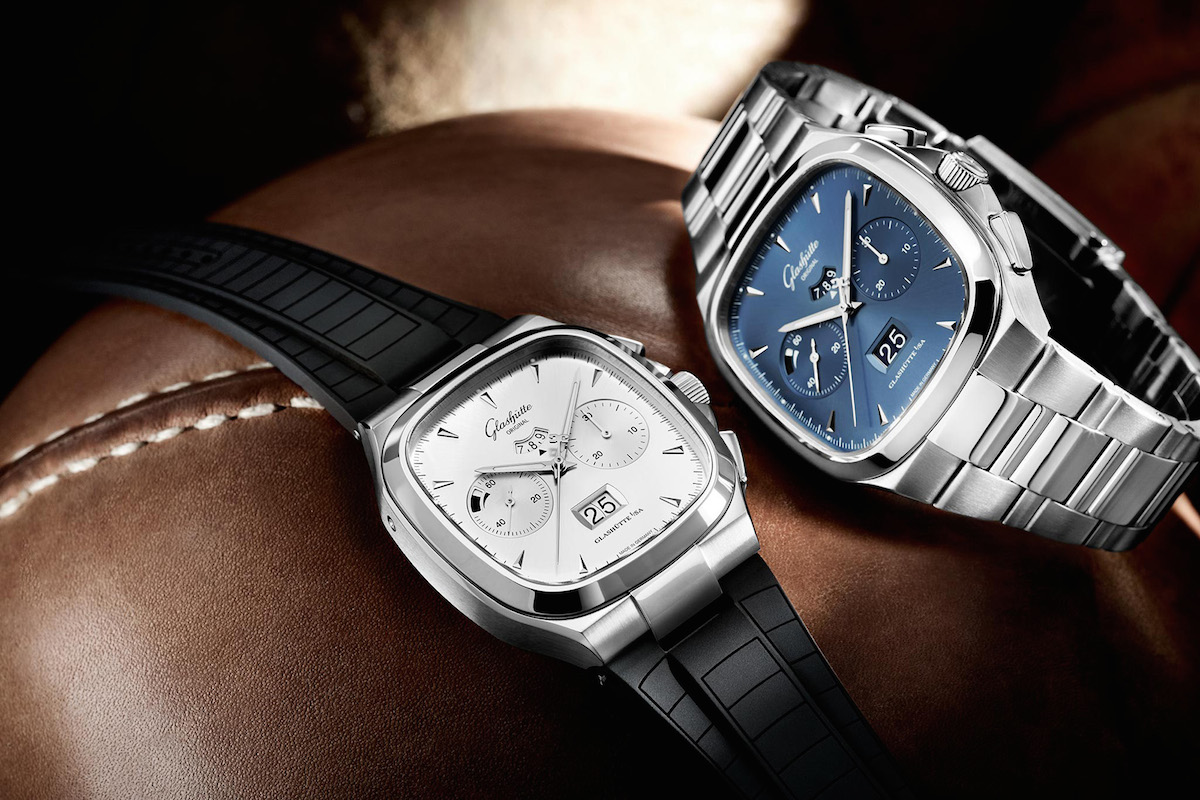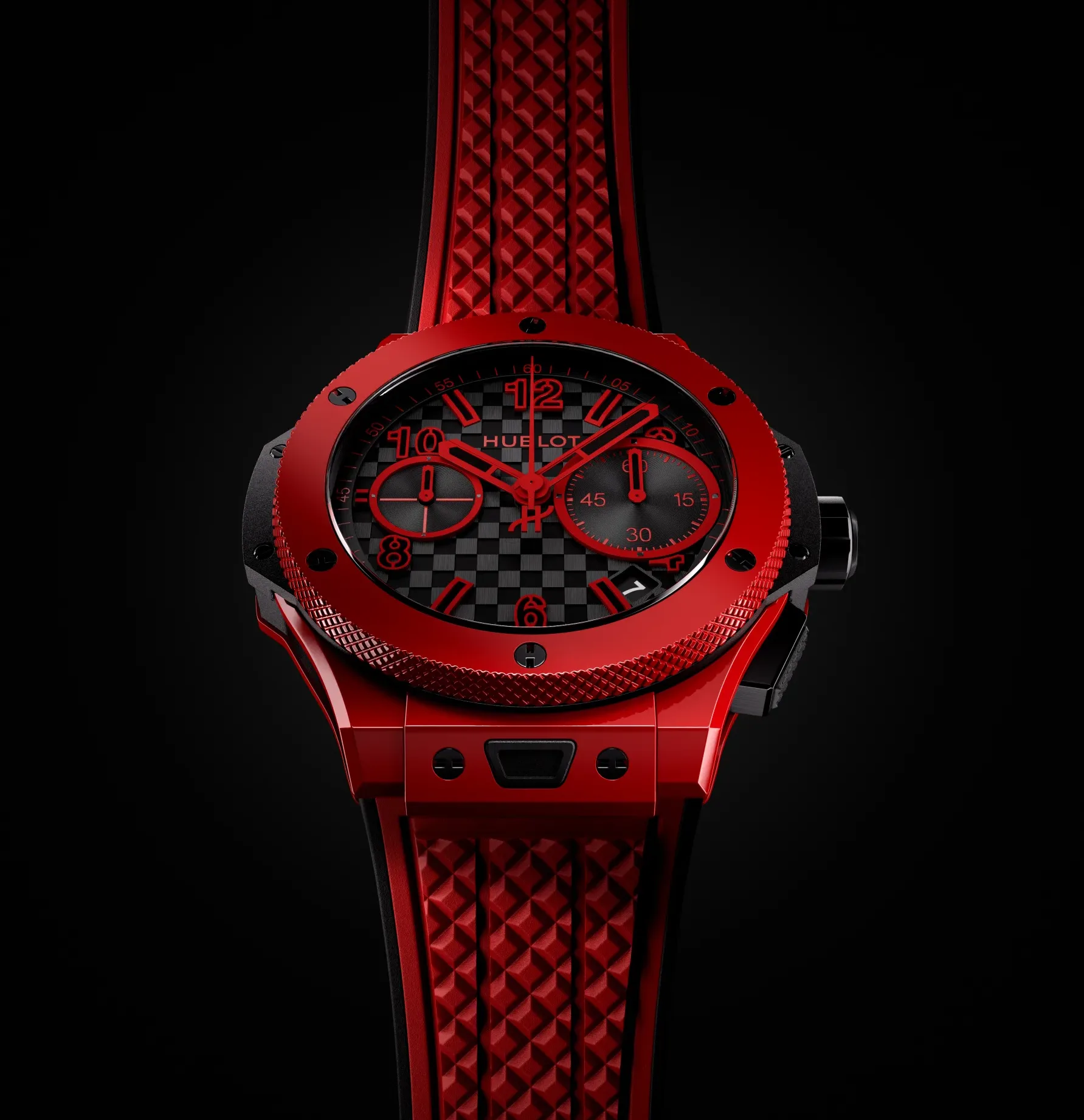Published by Monochrome
Making its first debut at Baselworld 2014 is the all new Glashütte Original Seventies Chronograph Panorama Date, which joins the brand’s elegant Vintage Collection, and here Monochrome gives us an first impressions with their Hands-On review.
Glashütte Original is using its historical background in two very nice collections, the Sixties (which, no surprise, is inspired by 1960s watches) and the Seventies, already existing in a three hands edition, with the famous Panorama Date complication. This latter collection is using a particular case, a shape mixing square and round angles that reminds us of some Omega Speedmasters of 1973-1974. The stainless steel case is made of a satin-finished main part with integrated lugs and a raised mirror-polish bezel. Even if inspired by old school watches, the Glashütte Original Seventies Chronograph looks surprisingly modern. The finish of the case uses the same standards as the rest of the GO collection, so you can expect a German sense of details and some serious manufacturing.

The newly introduced chronograph movement is a major part of that Seventies Chrono’s appeal. We’ve presented it to you in our extensive hands-on article about the Senator Chronograph. Here is an excerpt:
The new in-house Calibre 37 – Reminder
This movement is entirely designed, developed and manufactured in-house in Glashütte, Germany. It’s an integrated chronograph movement that GO claims to be as simple as possible. However, when looking at the technical specifications, we feel a bit sceptical about how this Saxonian brand defines “simple.” The Calibre 37-01 is comprised of 450 parts, including 65 jewels.
The new calibre 37-01 features several complications:
- An integrated design – meaning that the chronograph parts are not added on the top of an existing movement (as a module) but fully integrated in the movement for a better flow of power and compactness
- A self-winding capacity in both directions and a 80h power reserve, with a single barrel
- A simplified column wheel mechanism to actuate all chronograph functions (activate, disengage and return to zero), which means a more precise and smooth start of the central chronograph second hand.
- A fly-back, that allows a quick reset of the second-hand by only pushing the button at 5 o’clock (no need to stop the chronograph, to set it back to zero and start the chronograph again)
- A big date – so-called Panorama Date – at 12 and a power reserve indicator at 9, in the small second counter
- A free-sprung balance that swings at 28.800vph (4 Hertz) for a better isochronism (accuracy over time) and precision. In classical watchmaking, the balance spring is fixed to a regulator, which allows small changes to the length of the spring, and thus adjusting the precision. The GO Calibre 37 has a free-sprung balance without regulator, as with Patek Philippe’s Gyromax, and the rate is adjusted by 4 weight screws (in gold) on the balance rim.
So Glashütte Original says simple… We say complicated. GO has aimed to create a “simple” movement for the watchmaker, so that various parts can be serviced, while other parts remain untouched in the movement. That makes it easier to work on and reduces the chance for errors/mistakes, and reduces the cost for service and repairs. It’s clearly a modern movement. And we love that. The Calibre 37 is part of the new generation of movements, like we can find in the modern Omega, IWC and Girard-Perregaux collections.
One thing to notice is that the Calibre 37 is really nicely built, considering the finishing and the layout of the elements. With the modern and integrated chronograph movements, mechanical parts are usually hidden. Here you can see the levers, balance and column wheel working.
The change of reference (to Calibre 37-02) was justified here by a minor difference in this movement concerning the hour counter of the chronograph. When the Senator uses a classical 12h counter, the Seventies is using a window at 12 o’clock with a rotating disc to indicate the elapsed hours.

The Glashütte Original Seventies Chronograph Panorama Date is available in a choice of 3 dials: Silver, Ruthenium (dark Grey) and Blue. All of them come with a brushed sunray pattern, livening the watch’s face, alongside the applied indexes and the circular graining of the sub-counters. The Seventies Chrono comes with an extensive choice of straps: an integrated stainless steel bracelet with fine adjustment buckle, a black rubber strap and an alligator leather (in blue, dark grey or black depending of the dials’ color).

The reasonable size of the case – 40mm x 40mm – and the integrated bracelets create a comfortable feeling once the watch is on the wrist. It combines a both sporty and chic feeling, as an IWC Ingenieur or, in another price range, a Patek Philippe Nautilus, with which it shares several design codes (integrated bracelet, seventies design, casual chic look). It is one of those watches that you can use in any situation, from a business meeting to a late-night drink by the pool (and you can even take a bath with it, as it can resist to a depth of 100m). It’s a casual watch, not a tool watch; and the quality of the finishing and the movement give it that extra upscale feeling that we love here at Monochrome-Watches.

The Glashütte Seventies Chronograph Panorama Date will be available for €12.200-Eur on leather or rubber strap and €13.400-Eur on stainless steel bracelet. More info on www.glashuette-original.com
A big thanks goes to our friends at Monochrome, for sharing this great article with us.




